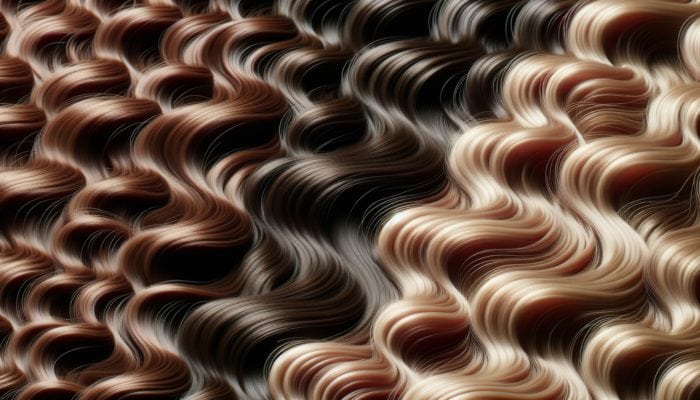Become an Expert in Subtle Hair Trimming for Effortless Waves
Explore Hair Texture Nuances for Perfectly Styled Waves

To successfully create delicate, barely-there waves through the intricate craft of trimming, it’s vital to develop a comprehensive understanding of hair texture. Every individual possesses unique hair characteristics that significantly impact the effectiveness of different trimming techniques. For instance, those with fine, straight hair require a distinct trimming approach compared to individuals with thicker, curlier hair. The primary objective for fine-haired people is to encourage volume and movement while avoiding excessive cutting, as over-trimming may lead to a flat, uninspiring appearance. Conversely, thicker hair often thrives with thoughtful layering that enhances the natural wave formation. Appreciating the complexities of each hair type is essential for achieving the desired aesthetic effect.
In the realm of hairstyling, understanding texture is paramount. For example, those with naturally wavy hair can amplify their inherent waves with minimal trimming, thus preserving their natural structure. In contrast, individuals with straight hair may need to embrace texturizing methods to create the desired wave effect. By recognizing these differences, hairstylists can customize their techniques to ensure that each cut contributes to the effortlessly chic, barely-there wave aesthetic.
Essential Techniques for Minimal Trimming to Enhance Natural Waves
Mastering the skill of minimal trimming is crucial for crafting natural-looking waves. The cornerstone of this technique lies in precision cutting, where the stylist focuses on removing only the necessary amount of hair to achieve the desired look. Techniques such as point cutting and slide cutting are indispensable in this process. Point cutting involves angling scissors into the hair ends, creating a softer edge that seamlessly blends with the wave. In contrast, slide cutting facilitates gradual texturization by gliding the scissors down the hair shaft, promoting a more organic appearance.
It’s crucial to resist the temptation to over-trim. The ultimate goal is to enhance the hair’s natural shape while preserving the volume and movement that characterize barely-there waves. By judiciously employing these techniques, one can maintain a full-bodied look while achieving that coveted subtle wave effect. Additionally, educating clients about the importance of regular trims reinforces the concept that even minimal cutting is essential for sustaining healthy hair and the desired style.
Key Tools Required for Achieving Precision in Hair Trimming
To achieve stunning results when crafting barely-there waves, it is essential to equip yourself with the proper tools. Sharp scissors are indispensable; dull blades can result in uneven cuts and damaged ends, ultimately detracting from the sleek appearance of the waves. A fine-toothed comb is equally important, as it aids in precise sectioning and ensures smooth tension during the trimming process.
Moreover, thinning shears can prove particularly advantageous for individuals with thicker hair, as they help reduce bulk while maintaining length. Selecting the right brush, ideally a vent or paddle brush, can assist in detangling and smoothing the hair prior to trimming. Taking the time to choose high-quality tools not only enhances the trimming experience but also significantly influences the final result, resulting in beautifully styled, barely-there waves.
How to Maintain Gorgeous Barely-There Waves Effectively

Establishing a Comprehensive Daily Hair Care Routine for Maintenance
Creating a robust daily hair care routine is critical for maintaining the allure of barely-there waves. Gentle brushing is vital; using a wide-toothed comb or a soft-bristle brush helps detangle hair without disrupting the wave pattern. It’s essential to avoid harsh tugging, as this can lead to frizz and breakage, ultimately compromising the overall look of your waves.
Furthermore, incorporating suitable products into your daily regimen can significantly assist in preserving the texture and definition of your waves. Lightweight, hydrating leave-in conditioners or curl enhancers can provide essential moisture without weighing the hair down. Regularly inspecting your hair for signs of dryness or damage allows for timely interventions, such as deep conditioning treatments, ensuring that your waves maintain their natural beauty and vitality.
Selecting the Ideal Products for Optimal Wave Preservation
Choosing the right hair products is critical for enhancing and sustaining barely-there waves. Products specifically designed to create texture, such as sea salt sprays, can offer a light hold while adding volume. However, it is vital to select formulations that do not weigh the hair down; look for products free from heavy silicones and oils to achieve the best results.
Another crucial aspect involves utilizing mousse or lightweight styling creams that promote definition without stiffness. These products help keep waves intact throughout the day while permitting movement and bounce. Regularly reassessing product choices based on seasonal shifts or changes in hair condition ensures optimal maintenance, helping to keep your barely-there waves looking vibrant and fresh.
Effective Techniques to Preserve Waves Overnight
Maintaining barely-there waves overnight is essential to ensure they remain intact for the following day. Implementing specific practices can significantly extend the longevity of your style. One effective strategy is to use a silk pillowcase, which minimizes friction on the hair and helps maintain moisture levels, thereby preventing frizz.
Additionally, loosely securing the hair in a bun or braid can help prevent tangling while allowing the waves to stay defined. Here are some key practices for overnight wave preservation:
- Utilize a silk or satin pillowcase to reduce frizz.
- Loosely tie hair in a top knot or braid to avoid tangling.
- Avoid tight hairstyles that create unnecessary tension on the hair.
- Apply a light leave-in conditioner before bedtime for added moisture.
- Consider using a wave-enhancing spray for extra definition and hold.
- Keep hair loosely secured to prevent tangling during sleep.
- Regularly assess the hair’s condition to determine product requirements and adjustments.
- Limit exposure to moisture overnight to maintain wave integrity.
By integrating these practices into your nightly routine, you can awaken with beautifully maintained, barely-there waves, ready to embrace the day ahead with style.
Expert Insights on Crafting Beautiful Barely-There Waves Through Trimming
Real-World Success Stories of Barely-There Wave Trimming
The artistry of trimming for barely-there waves is exemplified by renowned hairstylists around the globe. Many have mastered techniques that enhance natural textures, leading to stunning results. For instance, stylist Sarah, based in London, frequently employs point cutting to elevate her clients’ natural waves without sacrificing length. This method not only fosters movement but also ensures that the waves appear effortless and organic.
Another exemplary practitioner is Daniel from Sydney, who skillfully combines slide cutting and layering to achieve soft, cascading waves. His work with clients possessing thick, curly hair exemplifies how minimal trimming can polish the shape while still celebrating the hair’s natural texture. These real-world examples underline the importance of personalized trimming techniques tailored to individual hair characteristics, reinforcing the idea that a customized approach yields the most satisfying results for barely-there waves.
Step-by-Step Guide to Achieving Subtle Waves Through Trimming
Achieving barely-there waves through trimming requires a systematic approach focused on precision and technique. Begin with clean, dry hair, which facilitates an accurate evaluation of the hair’s natural behavior and movement. Next, section the hair into manageable parts to ensure thoroughness during the trimming process. Use sharp scissors to start removing minimal lengths, concentrating on the tips to maintain the overall shape and design of the waves.
Following this, apply techniques such as point cutting. This involves angling the scissors into the hair ends rather than cutting straight across. This method softens the edges, fostering a more natural wave. Gradually work through each section, consistently checking for balance and symmetry in the overall shape. Finally, complete the process with a light texturizing spray to enhance definition and maintain the barely-there wave effect. These steps, executed with precision and care, will yield beautifully crafted waves that exude effortless chicness and style.
Expert Analysis on the Impact of Trimming on Wave Development
The effect of trimming on wave formation is significant and multifaceted. Each technique applied during the trimming process can dramatically influence how waves develop and hold. For example, blunt cuts often yield a more structured appearance that may not complement the fluidity sought in barely-there waves. Conversely, soft, layered cuts encourage natural movement and enhance texture, allowing for a more effortless look.
Additionally, the frequency of trims plays a pivotal role in maintaining hair health and integrity. Regular trims not only prevent split ends but also promote healthier growth, contributing to the overall vibrancy of the waves. As hair evolves, adapting trimming techniques to enhance waves becomes essential. Recognizing these dynamics enables hairstylists to optimize wave formation, ensuring clients consistently achieve their desired styles.
Understanding Hair Texture’s Role in Trimming for Barely-There Waves
Hair texture is a crucial factor in the trimming process for achieving barely-there waves. Each texture—be it straight, wavy, or curly—requires a customized approach to ensure optimal results. For instance, straight hair may require more layering to foster movement, while wavy hair can often showcase its natural texture with minimal trimming.
Understanding how different textures respond to various cutting techniques is vital. For example, finer hair may benefit from feathering techniques that add texture without sacrificing volume. In contrast, thicker hair may necessitate strategic thinning to avoid heaviness that can weigh down waves. By prioritizing hair texture throughout the trimming process, hairstylists can effectively enhance each individual’s unique wave pattern, resulting in a more personalized and flattering style.
The Benefits of Embracing Barely-There Waves
Enhancing Your Natural Beauty with Effortless Waves
Barely-there waves possess an extraordinary ability to enhance an individual’s natural beauty by introducing subtle texture and movement to the hair. This effortless style often complements various facial structures, accentuating features without overshadowing them. The gentle waves create an air of sophistication while maintaining a relaxed aesthetic, making them suitable for a wide range of occasions, from casual outings to formal events.
Additionally, the soft waves contribute to an overall youthful appearance, providing an illusion of volume and dimension that can rejuvenate dull hair. Essentially, barely-there waves act as a canvas for showcasing personal style, allowing individuals to express their unique identities through their hair. This versatility is particularly appealing, as it seamlessly transitions from day to night, enhancing one’s overall presence and charm.
Styling Versatility: Adapting Barely-There Waves for Various Occasions
The versatility of barely-there waves stands out as one of their most attractive features. This style can be effortlessly adapted for various occasions, ranging from a relaxed beachy vibe to a polished, sophisticated look. By adjusting the placement and intensity of the waves, individuals can customize their hair to suit their mood or specific event.
For instance, pairing barely-there waves with a sleek low bun can elevate one’s appearance for a formal gathering. Conversely, the same waves can be left loose and tousled for a casual brunch with friends. The ability to switch between styles effortlessly makes barely-there waves an ideal choice for those with busy lifestyles. This adaptability ensures that individuals can maintain a fresh and stylish look with minimal effort.
Understanding the Impact of Barely-There Waves on Hair Health
The influence of barely-there waves on overall hair health is noteworthy, particularly when achieved through minimal trimming techniques. By focusing on maintaining length while removing only what is essential, individuals can prevent split ends and breakage, promoting healthier hair growth as less stress is placed on the strands during the trimming process.
Moreover, using lightweight products to enhance waves significantly contributes to hair health. Overly heavy products can lead to build-up, which may weigh hair down and detract from its natural shine. By selecting appropriate products that nourish without compromising volume, individuals can enjoy the benefits of beautiful waves while promoting healthier hair overall. This balance nurtures both aesthetic appeal and hair integrity, allowing for a sustainable hair care journey.
The Convenience of Maintaining Barely-There Waves
Barely-there waves are particularly appealing for individuals with hectic lifestyles due to their ease of maintenance. This style generally requires minimal effort to achieve and uphold, allowing for a low-maintenance yet chic appearance. With the right techniques and products, one can attain beautiful waves that last throughout the day without requiring excessive styling efforts.
A straightforward daily routine involving gentle brushing and the application of lightweight styling products can keep the waves looking fresh and vibrant. Additionally, the nature of this hairstyle allows for natural movement, meaning that even as the day progresses, the waves will continue to look effortlessly stylish, negating the need for constant touch-ups. The low-maintenance aspect of barely-there waves makes them an ideal choice for those seeking a sophisticated look without the commitment of intricate styling.
Suitability of Barely-There Waves for All Hair Types
One of the most significant advantages of barely-there waves is their compatibility with a wide variety of hair types. Whether straight, wavy, or curly, this style can be adjusted to enhance natural texture. For instance, those with straight hair can create waves through techniques such as curling or using texturizing products, while individuals with naturally wavy or curly hair can embrace their texture with minimal trimming.
This inclusivity opens the door for everyone to enjoy the beauty of barely-there waves. Tailoring trimming techniques to suit each hair type ensures that the final outcome complements the individual’s natural texture, resulting in a flattering and personalized appearance. This adaptability makes barely-there waves an ideal choice for a diverse audience, celebrating the uniqueness of each hair type while promoting a stylish aesthetic.
Proven Techniques for Crafting Barely-There Waves Through Trimming
Consulting a Professional Stylist for Expert Advice
Engaging with a professional stylist is crucial for achieving the perfect barely-there waves through trimming. A skilled stylist possesses the expertise and experience necessary to assess an individual’s hair texture and face shape, enabling them to recommend the most suitable trimming techniques. This personalized approach helps ensure that the end result aligns with the client’s desired look.
Additionally, a professional stylist can provide invaluable insights into product selection and maintenance routines, empowering clients to effectively sustain their barely-there waves. Regular consultations also allow for adjustments as hair grows and changes, ensuring that the style remains fresh and relevant over time. Investing in professional guidance can significantly enhance the overall experience and outcomes in achieving beautifully crafted, barely-there waves.
Customizing Trimming Techniques Based on Individual Hair Types
Customizing trimming techniques according to hair types is essential for achieving optimal results with barely-there waves. Each hair type—fine, medium, or coarse—requires a tailored approach to ensure optimal wave formation and maintenance. For instance, fine hair may benefit from light layering to add volume and movement, while thicker hair might require more intensive texturizing to prevent heaviness.
Furthermore, understanding the natural behavior of hair is vital. Curly hair, for example, often requires a different cutting approach to avoid creating a pyramid shape. Thus, adopting tailored strategies for each hair type not only enhances the aesthetic appeal of barely-there waves but also promotes overall hair health. By recognizing and adapting techniques, hairstylists can create stunning, personalized results that celebrate each individual’s unique hair characteristics.
Adapting Trimming Strategies as Hair Grows
Adjusting trimming strategies as hair grows and changes is crucial for maintaining barely-there waves. As hair length increases, various sections may require attention to ensure the waves remain balanced and well-defined. Regular trims, ideally every six to eight weeks, can help preserve the shape while addressing any areas of concern.
Here are a few key strategies for adapting trimming:
- Regularly assess hair growth patterns to determine cutting needs.
- Modify layering techniques as hair length increases to maintain shape.
- Evaluate hair health and adjust products accordingly for optimal results.
- Seek professional advice during transitional periods to ensure proper maintenance.
By proactively adapting trimming strategies, individuals can maintain the beauty and functionality of their barely-there waves, ensuring they always look their best.
Incorporating Layering Techniques for Enhanced Wave Definition
Layering techniques play a vital role in enhancing the natural flow and volume of barely-there waves. By strategically cutting different lengths throughout the hair, stylists can create depth and movement that accentuate the wave pattern. This technique also helps prevent the appearance of heaviness in thicker hair types, allowing for a more lightweight, airy look.
Incorporating layers can also add versatility to styling options. For instance, layers facilitate easy updos or half-up styles that still showcase the waves. When performed skillfully, layering can transform flat hair into a dynamic, textured masterpiece that embodies the essence of barely-there waves. This technique, when combined with proper maintenance, ensures that the waves remain lively and beautifully defined.
Maintaining Barely-There Waves with Regular Trims
Regular trims are essential for preserving the shape and health of barely-there waves over time. As hair grows, split ends can compromise the overall appearance, leading to a frayed look that detracts from the sleekness of the waves. Scheduling trims every six to eight weeks allows for consistent upkeep, ensuring that the waves remain well-defined and healthy.
Moreover, regular trims facilitate the removal of any damaged ends, fostering healthier growth and enhancing the vibrancy of the waves. This commitment to maintenance not only preserves the aesthetic appeal but also contributes to the overall integrity of the hair. By prioritizing regular trims, individuals can ensure their barely-there waves continue to look fresh and inviting, enhancing their overall style and presence.
Avoiding Common Mistakes in Trimming for Waves
Recognizing the Risks of Over-Trimming
Over-trimming is a common mistake that can greatly affect the formation of barely-there waves. When excessive hair is removed, the natural texture may be lost, resulting in a flat style rather than a lively one. This error often arises from a desire for immediate results and can lead to frustration as individuals struggle to recreate their desired waves after a cut.
To avoid over-trimming, it is crucial to approach each cut with care, focusing on precision rather than quantity. Open communication with your stylist regarding desired outcomes can also help prevent unnecessary trimming. By prioritizing a thoughtful, measured approach, individuals can maintain the integrity of their waves while still achieving the necessary shape and definition.
The Risks of Using Inappropriate Tools for Trimming
Utilizing the wrong tools for trimming can result in negative outcomes that affect the quality of barely-there waves. Dull scissors can create uneven cuts, leading to frayed ends that disrupt the wave pattern. Additionally, using unsuitable combs or brushes can create tangles and breakage, undermining the overall health and appearance of the hair.
To achieve the best results, it is critical to invest in high-quality tools specifically designed for precision cutting. Sharp scissors and fine-toothed combs are essential for ensuring clean, accurate cuts that enhance the natural beauty of the hair. Regular maintenance and checking the condition of these tools can further elevate the trimming experience, leading to stunning, barely-there waves.
Understanding the Importance of Consistent Maintenance
Neglecting consistent maintenance is a significant mistake that can lead to the deterioration of barely-there waves. Without regular upkeep, hair can become damaged, with split ends detracting from the overall appearance. This neglect can also result in the waves losing their definition, leading to a flat, lifeless look.
Establishing a regular maintenance routine, including trims and product assessments, is vital for preserving the beauty of barely-there waves. Scheduling appointments every six to eight weeks ensures that hair remains healthy and vibrant, allowing the waves to flourish. Additionally, maintaining a daily care regimen can further support the longevity of the style, promoting overall hair health and vitality.
Understanding the Importance of Appropriate Trimming Techniques
Neglecting the right technique during trimming can lead to unsatisfactory outcomes when aiming for barely-there waves. Each cutting method serves a specific purpose, and failing to implement the appropriate technique can result in a style that appears unrefined or chaotic. For example, neglecting point cutting can lead to harsh edges that disrupt the wave pattern, while overlooking layering techniques can create a bulky appearance.
It’s crucial to educate oneself on the various cutting techniques available and communicate desired outcomes with the stylist. By prioritizing the right methods, individuals can ensure that their trimming experience yields beautifully crafted waves that embody effortless elegance and style.
Recognizing the Importance of Hair Type and Texture in Trimming
Ignoring hair type and texture during trimming can lead to improper cuts that hinder the formation of barely-there waves. Each hair type possesses unique characteristics that influence how it responds to cutting techniques. For instance, thick hair requires different handling than fine hair to achieve the same wave effect.
To avoid this common pitfall, it’s essential to assess hair type and texture before proceeding with any trimming. Collaborating with a stylist who understands these nuances ensures that the approach is tailored to the individual, leading to optimal results. By recognizing and respecting the unique qualities of each hair type, individuals can achieve stunning barely-there waves that truly reflect their personal style and beauty.
Frequently Asked Questions About Barely-There Waves
What Are Barely-There Waves and How Do They Work?
Barely-there waves are soft, natural-looking waves that add subtle texture and movement to the hair without appearing overly styled. They create an effortless, laid-back aesthetic suitable for various occasions, enhancing your overall look.
How Can I Create Barely-There Waves at Home?
To achieve barely-there waves at home, use a curling wand on low heat, section your hair, and loosely wrap small sections around the barrel. Finish the look with a light texturizing spray to add definition and hold.
How Often Should I Trim My Hair to Maintain Barely-There Waves?
To maintain barely-there waves, regular trims every six to eight weeks are recommended. This practice helps prevent split ends and keeps the shape looking fresh and vibrant.
Which Products Are Best for Maintaining Barely-There Waves?
Lightweight products such as mousse, sea salt spray, and leave-in conditioners are ideal for maintaining barely-there waves. Avoid heavy products that may weigh down the hair and disrupt the natural wave pattern.
Are Barely-There Waves Suitable for All Hair Types?
Yes, barely-there waves can be achieved with all hair types. Techniques and products may vary, but with the right approach tailored to individual hair characteristics, everyone can enjoy this stylish look.
What Tools Do I Need for Trimming Barely-There Waves?
Essential tools for trimming barely-there waves include sharp scissors, a fine-toothed comb, and possibly thinning shears for thicker hair textures to achieve the desired effect without sacrificing length.
How Can I Preserve My Waves Overnight?
To preserve your waves overnight, utilize a silk pillowcase, loosely braid or secure your hair in a bun, and consider applying a light leave-in product to maintain moisture and definition.
Can I Create Barely-There Waves Without Using Heat?
Absolutely! You can create barely-there waves without heat by braiding damp hair overnight or using twist methods to encourage natural wave formation as the hair dries.
What Mistakes Should I Avoid When Trimming for Waves?
Avoid over-trimming, using dull or inappropriate tools, neglecting regular maintenance, and ignoring your hair type and texture for the best results in achieving beautifully crafted waves.
How Can I Add Volume to My Barely-There Waves?
To add volume to barely-there waves, incorporate layering techniques during trimming, use volumizing mousse during styling, and consider teasing the roots for added lift and bounce.
Connect with us on Facebook!
The Article: Building Barely-There Waves Through Trimming: Achieve Subtle Style appeared first on Amitys Hair Salon.
The Article Barely-There Waves: Achieve Subtle Style with Trimming Was Found On https://limitsofstrategy.com

